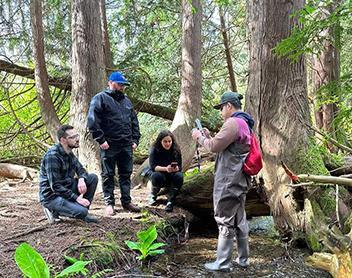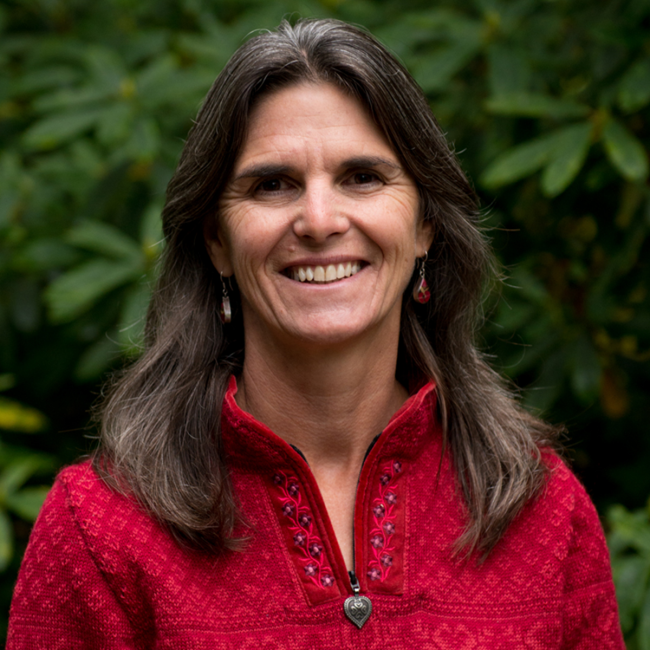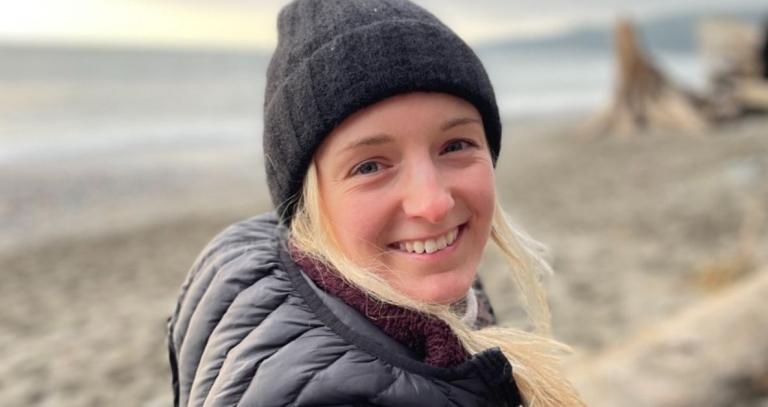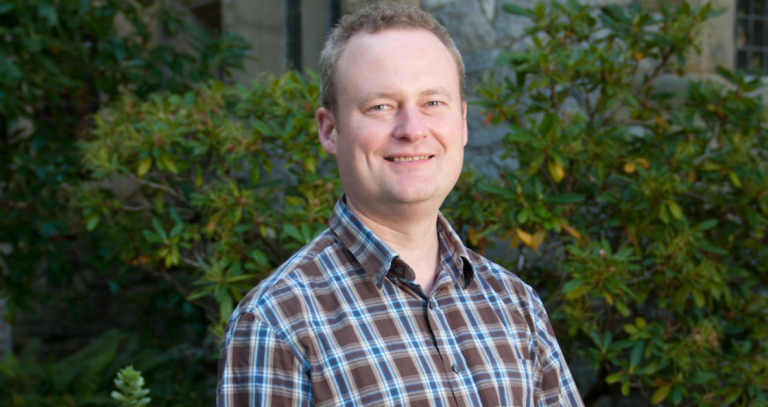Gain a broad overview of environmental science and policy. Learn workplace-ready skills in the environmental sector, and build your career solving scientific problems of global sustainability.
You’re a solutions-focused thinker who wants to develop your critical thinking abilities while gaining science and environmental knowledge.
Complete the last two years of your undergraduate degree through this flexible online program.
Accelerate your career, take on environmental challenges and build a diverse network.
Delivered online
Complete this entirely online program at a pace that works for your life and schedule.
Study abroad
Earn elective credits by studying at partner universities and colleges across Canada or abroad in Japan or Chile.
Practicum option
Take your learning to your own workplace to gain practical experience with a practicum.
Upcoming offerings
May 04, 2026
Program variation
Application deadline ℹ
Delivery model
Entry point
Domestic tuition
International tuition
September 08, 2026
Program variation
Application deadline ℹ
Delivery model
Entry point
Domestic tuition
International tuition
Related Schedules
January 04, 2027
Program variation
Application deadline ℹ
Delivery model
Entry point
Domestic tuition
International tuition
Related Schedules
May 03, 2027
Program variation
Application deadline ℹ
Delivery model
Entry point
Domestic tuition
International tuition
Related Schedules
Request more information
Make an impact in the environmental sector
The Bachelor of Science in Environmental Practice gives you the flexibility to personalize your learning and complete your undergraduate degree.
Based on your personal and professional interests in environment and sustainability, you’ll choose a path that makes sense for you.
You’ll study sustainable, scientific and interdisciplinary approaches to environmental policy, management, community development and more, so you can implement and inspire sustainable change.
Pursue a career that lets you take on environmental challenges while establishing your network.
→ This program is delivered entirely online. Learn more.
Flexible choices
This program gives you maximum flexibility in what you’ll learn and when you’ll learn it. You’ll choose from many electives, to shape your current, or future, career path. And you can power through in two years, or take your time to finish in as many as seven. Or, see what makes most sense as you go.
This program is related to the Bachelor of Arts in Environmental Practice, but differs in its focus. The courses you'll take are science-based, including:
- environmental health and safety
- environmental management
- geomatics
- green technology
- renewable energy
- science
Professional Certification
The Royal Roads University and ECO Canada (Environmental Careers Organization of Canada) partnership was established in response to the growing need for environmental education that teaches practical, industry-standard skills and prepares graduates for immediate entry to the workforce.
Through this alliance, we are able to provide knowledge and skills training aligned to National Occupational Standards (NOS), and informed by Canada’s leading body of environmental labor market research (ECO Canada).
When you have completed the Bachelor of Science in Environmental Practice program, you will have fulfilled the academic requirements for Environmental Professional (EP) certification through ECO Canada.
Earn your degree entirely online
Online courses consist of assigned readings, synchronous or asynchronous lectures, interactive discussions, and individual and team assignments.
In this program, you'll take 60 credits, and can complete them at your own pace, depending on your own life and schedule. Some students finish in as few as two and a half years, while others take up to the maximum seven years to complete their degree.
Online courses in this program are typically eight to 12 weeks long. Each online course requires approximately 20 hours of work per week.
You'll start your program with a non-credit, but required, course about academic integrity.
Course choices
You can also earn some of your elective course credits for this degree at many other universities and colleges across Canada or study abroad at one of our partner universities in Japan or Chile.
We co-operate to give you the chance to take a broader range of courses, and hone your skills in your specific field of interest. Please note that registration for these courses, and the distribution of the official transcripts back to us, may entail ancillary fees at the third party institution and are outside our control.
Completion options
You'll complete your degree credits by writing a research paper or completing a 75-hour practicum.
Research paper option
A research paper lets you write an extensive paper on a topic you are interested in. You'll work with an instructor to plan, conduct and document your research.
Practicum option
Take your learning to your own workplace, to gain practical experience with a practicum. You'll work with an instructor and your workplace supervisor to schedule and plan your project, and you'll document your experience.
Pathways into the BSc in Environmental Practice
You can start your journey toward a Bachelor of Science in Environmental Practice in more than one way. Whether you’re coming straight from high school or already have post-secondary or work experience, there’s a pathway that fits your background and goals.

Option 1: Start with an RRU undergraduate diploma
For students coming from high school.
If you’re just beginning your university studies, start by building your foundation through the Undergraduate Diploma in Applied Environmental Sciences. The program includes hands-on learning that can lead directly into the program once you meet admissions requirements.
Option 2: Enter directly into the BSc in Environmental Practice
Option 2: Enter directly into the BScEP program
For students with prior post-secondary or work experience.
If you’ve already completed university credits, a college diploma, or have relevant work experience, you may qualify to enter the program directly.
Our flexible admissions process considers your academic background, work experience, and life learning—not just your grades.
Want to chat about your options?
Courses
Courses listed below may be delivered in multiple ways (i.e., online or on campus); however, students in the BSc in Environmental Practice Degree Completion program typically take the online version.
Non-credit Required Course
ITAI
Introduction to Academic Integrity
0.0 Credits
Online
Required Core Courses
ENVP303
Statistical Literacy and Critical Thinking
3.0 Credits
Online
ENVP322
Sustainable Development: Ideas and Applications
3.0 Credits
Online
ENVP323
Communications Skills: Writing in the Workplace
3.0 Credits
Online
ENVP429
Ethics and Environment
3.0 Credits
Online
ENVM427
Public Policy Formulation
3.0 Credits
Online
ENVP313
Introduction to Environmental Law
3.0 Credits
Online
ENSC414
Global Processes
3.0 Credits
Online
ENVP426
Leadership and Management for Environmental Practitioners
3.0 Credits
Online
ENSC415
Environmental Management Tools
3.0 Credits
On Campus, Online
ENSC423
Environmental Economics
3.0 Credits
On Campus, Online
If you ARE taking ENVP450 Practicum in Environmental Practice, you will complete 27 credits (typically 9 courses) from the elective course list.
If you ARE taking ENVP451 Research Paper, you will complete 24 credits (typically 8 courses) from the elective course list.
Elective Courses
Electives may be taken at RRU or other external post-secondary institutions.
For a detailed list of these approved external courses, please refer to the program schedule on the overview page or contact the program office.
The following are elective courses offered by RRU.
INDS400
Global Perspectives on Indigenous Ways of Knowing
3.0 Credits
Online
ENSC304
Atmospheric Science and Air Quality
3.0 Credits
On Campus, Online
ENSC403
Industrial Processes
3.0 Credits
On Campus, Online
ENVM321
Tools for Business Decision Making
3.0 Credits
Online
ENMN429
Purpose-driven Business
3.0 Credits
Online
Faculty
Transfer agreements
Refine results
Standard admission
- Minimum of 60 post-secondary arts and/or science credits (18 must be science credits, nine of which must be at the second-year level), with a minimum GPA of 'B' (3.00/4.33), from a recognized post-secondary institution; or
- Completion of the Certificate in Environmental Practice (CEP) program (18 must be science credits, nine of which must be at the second-year level) at Royal Roads University, with a minimum GPA of 'B' (3.00/4.33). (The Certificate in Environmental Practice is no longer offered at RRU, however graduates of CEP may be eligible for admission to BEP).
Flexible admission
Applicants can be assessed for admission on the basis of their skills, knowledge, and background developed outside traditional learning structures or through a combination of academic and non-academic experience. These experiences must demonstrate sufficient knowledge, skills, and abilities to compensate for, and commensurate with, missing academic requirements, either in terms of credits obtained and/or GPA achieved.
Applicants who do not meet the Standard Admission requirements will be considered for flexible admission and assessed as follows:
- All applicants for the BSc EP must demonstrate (a) completion of the requisite 18 science credits, 9 of which must be at least at the 2nd year level, OR (b) specific equivalent competency through their work experience.
- Applicants who only miss the GPA requirements, but otherwise have the credits required for entry, will normally need at least three years of work or relevant volunteer experience, or combination of work experience and volunteer experience.
- Applicants who miss the post-secondary credit requirements will normally need at least five years of work, or a combination of academic achievement, work experience, or volunteer experience.
- All applicants must demonstrate the knowledge and skills normally gained during the completion of a two-year diploma.
English language requirements
- If English is not your primary language, please review our English language requirements.
Application requirements
All applications to this program require submission of the following information and supporting documents before your file can be assessed for admission.
Application form
In order to apply online, you will be required to create a log-in account using your email address. You will be required to list all credit courses and/or programs you have completed or are currently enrolled in.
An application fee will be required. If your application fees are being paid by a third party, review sponsored student information. Once submitted, you may check the status of your application at any time.
Missed your application deadline? While we can’t make any guarantees, we may be able to accommodate late applications if there's still space and enough time to process. If you're interested in an intake that is now closed to applications, apply for the next available intake and email Admissions with your preferred start date. Make sure you’re prepared to submit your program's required documents right away. We can't make an admissions decision without them.
Official transcripts
Applicants are responsible for arranging for the submission of official transcripts from ALL post-secondary (higher education) institutions currently or previously attended, for all credit courses and/or programs. Transcripts are not required for non-credit programs or courses, though some programs may require proof of professional certifications or designations.
Transcripts are considered official only if submitted directly by the Registrar or other recognized authority of the providing institution in the institution's original, sealed envelope. If the envelope has been opened, the transcripts are no longer official and new (official) transcripts will be required to complete your application.
All international transcripts or credentials are subject to an international transcript and/or credential evaluation.
Additional requirements for flexible admission
For applicants who will be reviewed under the flexible admission process the following additional supporting documents will be required:
Personal statement
Your personal statement should be no less than a one-page letter indicating your motivation for seeking entrance to the program. Your statement should comment upon your personal and career goals, the expectations you have for the program in relation to the achievement of your goals, and the strengths you feel you can bring to the program.
Letter of reference
Typically, applicants will provide one reference letter based on your work experience, academic performance, or community service that you have undertaken. There is no set standard for letter of reference format. The length and level of detail in each letter may vary.
Content of the reference letter should illustrate and support your suitability for admission to the Bachelor of Arts/Bachelor of Science in Environmental Practice program. Content may include how your referee feels you will succeed in the program (and why) and how the program will benefit you. Indication of demonstrated skills, competencies and aptitudes and other relevant information about which the referee can comment is beneficial. The context in which the referee has come to know you should also be mentioned.
Résumé
Your résumé should provide as much information as possible, with special attention given to the past ten years of your career. As a guideline, items in your resume should include:
- Education: List all post secondary education, degrees, diplomas, and certificates you have achieved.
- Training/professional development: List career related training and professional development programs completed within the past five years. Include the source of training, and the duration and year completed. List other training and personal development programs not already identified.
- Work experience: Please include name of organization, position, length of service and brief description of duties.
- Voluntary/unpaid work experience: List and describe any voluntary/unpaid post-secondary employment and/or community service experience. Please include the name of the organization, length of service, and a brief description of duties. List positions you have held in this service.
- Information technology training and experience: Briefly describe your level of training and experience in the use of information technology including computers, software and telecommunications networks as tools for business, education, teaching and personal use.
- Professional memberships/affiliations: List memberships and positions you hold/have held in professional associations, service clubs, community/volunteer sector.
- Other relevant information : Provide any other information which you believe is relevant to your application and will be of assistance to the review committee.
If applicable
- Applicants declaring permanent resident or Convention Refugee status in Canada, must submit a copy of their Permanent Resident Card (PR card) along with their application.
- Transcript evaluation fee or credential evaluation report, if submitting international transcripts.
- An official English language proficiency score report or other evidence of proficiency if English is not your primary language.
- Other information or documents as may be requested to determine your eligibility.
For information on how and where to send your supporting documents, please refer to the document submission guidelines
Financial aid and awards
Refine results
Tuition rates
Tuition rates for the Bachelor of Science in Environmental Practice vary based on individual completion plans, course start dates and total course credits.
Search for tuition fees to find this year’s per-credit rates.
Please note: These rates are calculated for each course using a per-credit rate calculation.
Ancillary fees
Ancillary fees for this program include a one-time Student Services fee and an annual Self-Paced Program Administration fee. This fee covers the added costs of the self-paced program, including managing custom schedules and all letters of permission needed to take courses at other institutions.
Visit Ancillary fees to find the current rates.
Please note: Tuition and ancillary fees are subject to increase each year as of September 1.
Have a question about tuition and fees?
Contact Student Accounts for support.
ECO Canada partnership
The Environmental Careers Organization of Canada and Royal Roads University are the founders of the Canadian Centre for Environmental Education.
Housed at Royal Roads, the CCEE aims to provide advanced education, training and professional development tailored to the Canadian environmental sector, aligned with the National Occupational Standards for Environmental Employment.
The Bachelor of Science in Environmental Practice is one of the programs we offer through the CCEE. Learn more about our formal partnerships with ECO Canada.





